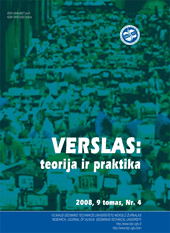Mokesčių sistemos vertinimo metodinio potencialo analizė
Analysis of the Methodological Potential in Evaluating Tax System
Author(s): Juozas Bivainis, Ilona SkačkauskienėSubject(s): Economy
Published by: Vilnius Gediminas Technical University
Keywords: Tax system; evaluating; methods; analysis.
Summary/Abstract: In evaluating such a complex phenomenon as tax system one has to resolve some problems. The largest one is that there has not been created a method for evaluating tax system that would be acceptable to most of the tax theorists and practitioners: it is difficult to define clearly measurable parameters for ever changing criteria of tax system evaluation. Having systematized the suggestions for evaluating tax system contained in specialized literature, there has come to light three methods of essentially different contents: 1) classical principles of taxation with their characteristic indices, 2) V. Tanzi‘s qualification diagnostic indicators, 3) J. B. S. Gill‘s diagnostic indicators. Every one of these methods allows us to evaluate different aspects of tax system. Generalized evaluation as to the application of these methods is as follows: 1) the analysis of tax system according to classical principles of taxation allows us to evaluate in quantitative terms the implementation of each principle, however such an autonomous, unrelated to the totality, examination of the principles limits comparative analysis of tax systems and does not provide us with a possibility to evaluate an entire tax system; 2) answers according to V. Tanzi‘s qualification diagnostic indicators give us a generalized evaluation of tax system, however this (as well as any other) qualitative evaluation has quite some subjectivity; 3) the analysis according to J.B.S.Gill’s diagnostic indicators is purposefully orientated to reveal aspects limiting the collection of state revenue through taxation, all the elements of tax system only being examined through the prism of tax collection, ignoring other principles of taxation; 4) only a combination of all the three groups of methods and this only replenished with some specific evaluations would be a suitable methodological basis for exhaustive and objective evaluation of tax system’s efficiency by way of their comparison and diagnosis of shortcomings, so that as a result of such examination we would be able to propose well-founded decisions aimed at reforming tax system and increasing its efficiency.
Journal: Verslas: teorija ir praktika
- Issue Year: 2007
- Issue No: 2
- Page Range: 57-67
- Page Count: 11
- Language: Lithuanian

